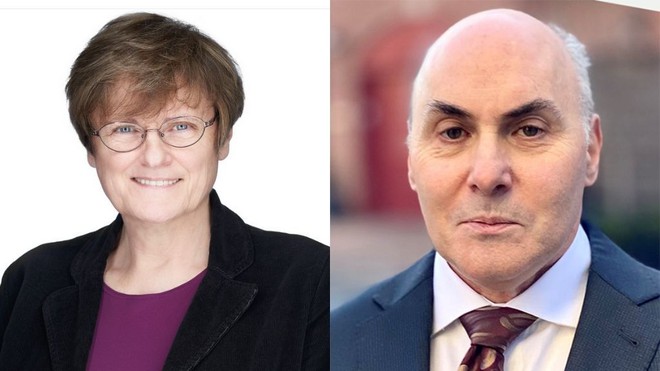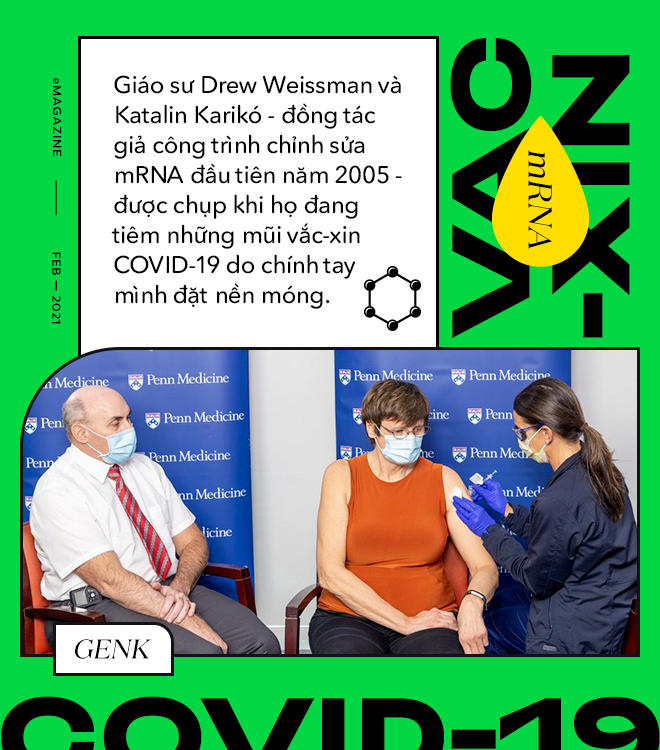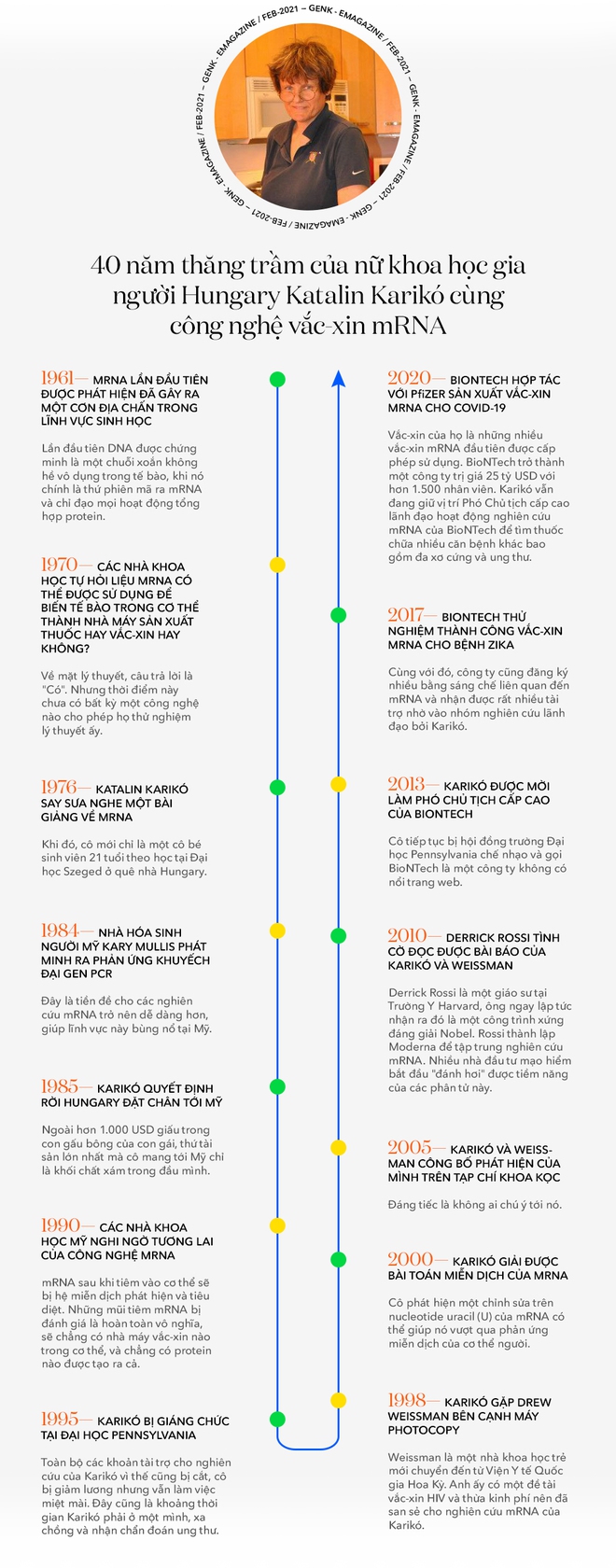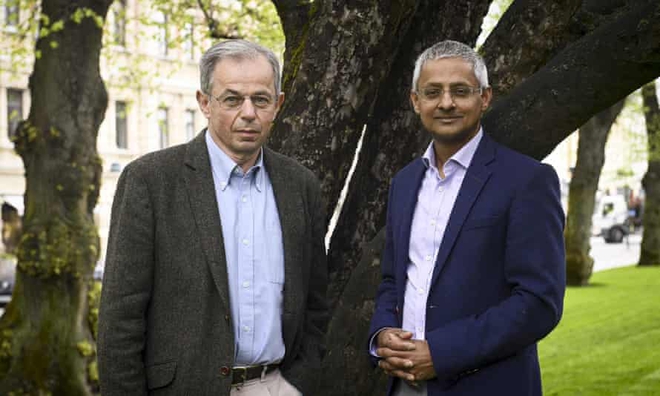The scientist who created the mRNA vaccine is awarded the $3 million Breakthrough Prize
- Tram Ho
Scientist duo Katalin Karikó and Drew Weissman, the people behind the successful COVID-19 mRNA vaccine, have just won a $3 million Breakthrough Prize.
This is one of the most valuable science awards on the planet. It is awarded to Karikó and Weissman’s effort over 20 years ago, when the duo discovered a way to safely and efficiently deliver messenger mRNA molecules into cells.
This discovery has led to the birth of a new vaccine technology, which can be rapidly developed as we see with Moderna, BioNTech and Pfizer’s COVID-19 vaccines. In addition, mRNA vaccines could also be developed for other diseases such as HIV, genetic diseases and cancers.

Scientists Katalin Karikó and Drew Weissman have just won a Breakthrough Prize worth $3 million.
We know today’s doses of the mRNA vaccine for COVID-19 work by wrapping the SARS-CoV-2 virus’s mRNA information into a nanolipid envelope, delivering them inside the cell to guide the genome of the virus. cells that produce viral spike proteins.
In other words, mRNA turns every cell in our body into a vaccine factory. When the spike protein of the SARS-CoV-2 virus is produced, it stimulates the body to respond by producing antibodies to the virus. These antibodies will help us prevent real infections and reduce the risk of severe illness and death if we remain infected with COVID-19 or its variants.
Back three decades ago, the idea of an mRNA vaccine was met with resistance from many scientists. No one thought it could be developed successfully. That’s because mRNA, once introduced into the body, immediately causes an acute immune response, in which immune cells treat the mRNA as a foreign molecule and break it down.
But in the early 2000s, the duo of scientists Katalin Karikó and Drew Weissman at the University of Pennsylvania found a way to combat this acute immune response. Specifically, they replaced a nucleotide molecule in the mRNA called uracil (U) with an artificial molecule with a similar structure.
This allows the mRNA to pass the immune test to survive inside the cell, triggering it to make antigens and then the immune system to make antibodies.
Despite widespread skepticism, confidence in the promise of an mRNA vaccine has enabled Karikó and Drew Weissman to create a technology that is not only vital to the fight against coronavirus today, but also delivers holds great promise for future vaccines and treatments to deal with many diseases including HIV, cancer, autoimmune and genetic diseases ,” the Breakthrough Awards website says.

Few people know how much skepticism Katalin Karikó and Drew Weissman endured before being honored in this award. The paper and patent for their technique of altering uracil mRNA was published in 2005 and no one cares about it.
Karikó had even suffered estrangement at the university for 10 years before that just because she tried to pursue the idea with mRNA technology. Karikó was demoted, salary cut, and funding reduced while receiving a cancer diagnosis. She was even laughed at by other scientists after leaving her job and joining BioNTech, the rare biotech company that saw the potential of mRNA technology at the time.
Looking back on these days after being named for the Breakthrough Prize, Karikó said that although it was the name of the award, a ” breakthrough “, the research to get to this final destination” definitely not a leap .”
Karikó hopes to give back part of its bounty to the research of future mRNA therapies and vaccines, such as cancer vaccine projects.
“I’m happy to be one of the contributors to this [vaccine technology]. But I’m also wondering how much progress [earlier scientists’ work] needs to be to achieve. It took decades, in many fields, to achieve this. I want to pay my respects to the hundreds of people who have been involved in that process, ” she said.

The Breakthrough Prize is an idea that was originally initiated and sponsored by Russian-Israeli billionaire Yuri Milner in 2012, later joined by many other billionaires including Facebook founder Mark Zuckerberg. .
True to its name, the Breakthrough Prize is awarded to scientific works that make breakthroughs in 3 fields of Mathematics, Basic Physics and Life Sciences. Each winning scientist or group of scientists will receive an amount of 3 million USD.
This year, there are 3 Breakthrough Prizes awarded in the field of Life Sciences, 1 prize in the field of Basic Physics and 1 in the field of Mathematics, bringing the total prize value to more than 15 million USD.
Another Life Sciences Breakthrough Prize was presented to a group of scientists: Shankar Balasubramanian and David Klenerman at the University of Cambridge, UK, Pascal Mayer at research firm Alphanosos in Riom, France, for their work invented a new gene sequencing technique in the mid-2000s.
This technique has allowed us to sequence genes 10 million times faster. It is also a weapon that helps us decipher the genome of the SARS-CoV-2 virus from the first days of its appearance and continue to track its variants to this day.

Shankar Balasubramanian (right) and David Klenerman (left) at the University of Cambridge, UK
The Life Sciences Breakthrough Award finally went to chemical biologist Jeffrey Kelly at Scripps Research Center in California, USA for finding the cause of amyloid neurodegenerative disease and development. an effective treatment for it.
Meanwhile, the Breakthrough Prize in the field of Basic Physics was presented to the pair of scientists Hidetoshi Katori at the University of Tokyo and Jun Ye at the US National Institute of Standards and Technology for the invention of the bronze. The world’s most accurate quantum lake, with an error of only 1 second after 15 billion years. It has improved the accuracy of our time measurements by more than 10,000 times.
The Final Breakthrough Prize in Mathematics was awarded to Takuro Mochizuki at Kyoto University, Japan, for broadening the understanding of algebraic structures known as ‘three-dimensional modules’ – related related to certain types of differential equations. This discovery is said to have opened a new mathematical horizon, solving ” singularities ” where all the equations we use today no longer make sense.
Source : Genk
